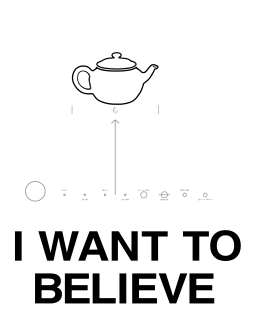The Agnosticism Of Faith
Close that dropped jaw. We’re not done yet.
You’re an agnostic.
Okay, now you’re giving me the evil eye and gathering the pitchforks. But hold on for a minute and let me explain.
A simple definition of agnosticism is:
According to philosopher William L. Rowe, in the strict sense, agnosticism is the view that human reason is incapable of providing sufficient rational grounds to justify either the belief that God exists or the belief that God does not exist.
http://en.wikipedia.org/wiki/Agnosticism
The key is in the distinction between knowledge and belief. As the http://atheist.about.com site says:
Whereas atheism involves what a person does or does not believe, agnosticism involves what a person does or does not know. Belief and knowledge are related but nevertheless separate issues.
We could just as easily substitute “Christian” for atheism in this quote. Therein lies my point.
While I have some good reasons to believe in a creator, I can’t know 100% within my own knowledge that there is one.
While I have my reasons for believing that the God of the Bible is that creator, by my own reasoning ability I am unable to know they are one and the same.
While I’ve had some experiences which lead me to believe God is involved in my life—and some that would seem to say not—I can’t rule out those being coincides. I can’t know that God did this or that in my life.
No one can know these things within the limits of human reason. By definition, our knowledge is limited. Without knowing all things, what we don’t know could easily change all our perceptions and conclusions.
Even the Scriptures support this reality.
For my thoughts are not your thoughts, neither are your ways my ways, saith the LORD. For as the heavens are higher than the earth, so are my ways higher than your ways, and my thoughts than your thoughts.
(Isaiah 55:8-9)
Are we getting the idea that what we know is a very small slice of the reality pie? We only see pieces of the picture, like a puzzle only one quarter finished. Our knowledge can only take us so far. In truth, if we are honest with ourselves, we are agnostic in our knowledge of God and who He is.
While we are all agnostics, none of us live without belief.
Life forces us to believe in something, even if it is the default belief that there is no God by not believing in one. One cannot live agnosticism. Life forces us to make a decision based on how we live our lives. Based on who or what we place our faith in.
Since none of us can investigate every possibility and option, we end up placing our faith in a testimony. Like we are forced to rely upon a doctor’s expertise to diagnosis sickness and provide a cure because we can’t all go to medical school, when it comes to God, we are forced to rely upon the testimony of others.
Faith is so often made out to be some esoteric, abstract power we can mentally grab and use to get saved or do miracles. That is an incorrect understanding. Faith is placing one’s trust in someone or something. For Christians, it is placing our trust and life in the hands of Jesus Christ of who the Scriptures testify.
It means to believe in Jesus Christ, the life He gives, and the life He wants us to experience. To trust that what He says is true and live by it. That is faith. It is why James says that faith without works is dead. Faith means belief and follow-through on that belief.
Faith starts when we acknowledge our agnosticism.
And straightway the father of the child cried out, and said with tears, Lord, I believe; help thou mine unbelief.
(Mark 9:24)
Because if we know enough to have no need to trust in Christ testified of by the Scripture and countless saints throughout history, then we’d be a god.
How do we come to that trust and faith? How do we know who to trust?
We all have our reasons through either deductions, inductions, experiences, or a combination of them. Even then, in our own reason we can’t know we’ve got it right. We may believe we do, but that is different from knowing.
In the end it is as Paul said,
Now faith is the substance of things hoped for, the evidence of things not seen.
(Hebrews 11:1)
This is not a “God of the gaps” concept which posits God’s activity for what we don’t know. Rather, it posits God’s existence despite our inability to know He does exist. We can’t “see” the reality, but our faith in Jesus Christ provides the evidence we can’t see. We rely upon the Biblical testimony.
Faith starts with acknowledging our agnosticism.
Christian speculative fiction can highlight this struggle. What are some good examples of books that reflect this struggle? What speculative fiction titles have influenced your faith?












































Rick, I feel I can show that the existence of God is more likely than the non-existence of God. I believe that can be logically demonstrated. But the strength of the evidence is not sufficiently strong for me to, say, give my life over to Him in certainty of what will happen.
I think the nature of faith is somewhat different that what people commonly think it is. Abram had a logical reason to follow God into Canaan–God had appeared to him and spoken to him. But the evidence was flimsy compared to the response expected of him–get up an move the entire family, based on a voice? Likewise, God had already spoken with Abraham at his tent, had already destroyed Sodom and Gomorrah, had already provided for the miraculous birth of Isaac, when God told Abraham to take his son on the mount and sacrifice him. Abraham had a reason to believe in God, but that reason never specifically included the sacrifice and/or resurrection of sons. Faith, I think, starts with a basis in something reasonable and applies it in new directions. In that way, faith is imaginative–and this is one of the meanings of “childlike faith” that most people don’t consider.
Likewise the generation with Moses in the wilderness. They saw God part the Red Sea and do the plagues in Egypt. But they did not see Him feed people in the wilderness or provide water. Their “belief” stuck to what was already done and refused to extrapolate, hemmed in by fear and doubt.
I happen to think God has shown enough to know He exists as much as I know anything else. But faith comes when I start to accept specific things about Him as true–like the Bible. And even moreso when I follow Him…
If it makes you feel better, I would still like you even if you were an agnostic in the usual usage.
I’ve always appreciated Mark 9:24 and the first time I remember that verse really making an impression was in a dystopian I read years and years ago where a family was praying for their child to be healed and one person told them he wasn’t healed because they didn’t believe enough and someone else reassured them with that verse. I’m trying to remember the title…
I’ve always liked the song Never Alone by Barlow Girls and it has a similar theme of faith.
The conflation between faith and knowledge is a leading factor that lead to my disillusionment and discontent with the faith for so long. As a child I really did think that to believe in Jesus was to be mentally persuaded of the truth of the Gospel, though I also had a deep fear that that might not be enough. When I started to understand that absolute knowledge and personal certainty were not possible, I lost all assurance of salvation.
By evangelical pop soteriology, it would be impossible for anyone who knew the truth of Christ to be reject Him and remain “unsaved” (if absolute knowledge were possible). Similarly, a “testimony” is more often a statement of definitive belief or of a definitive conversion experience than an honest account of one’s faith journey.
Bainespal,
My use of testimony here is more oriented to the Scripture’s testimony of who Jesus is and what He came to do, and the great number of saints whose lives confirm that. We are placing our faith in the person of Jesus Christ based on their witness of the truth as they experienced it with Him.
Most of us never have or will have Paul’s knock-you-off-your-donkey vision and God talking to us in an audible voice. Even if we did, few would have the discernment to know whether it was God or a demon coming to us as an angel of light.
So if we believe, we do so based upon the testimony, the witness, of others. Not because of our rational abilities. Doesn’t mean the belief doesn’t have some rational basis, but that can’t be the foundation of faith.
The child-like faith Travis mentioned plays into this. They don’t have faith based upon intellectual knowledge, but upon faith in what they’re told. Jesus said unless our faith is that of a child, we cannot enter the kingdom of heaven.
Could my faith end up wrong? Sure. But you either believe in something, invest your life into a reality, or you don’t. Like in the parable of the talents, the only one who ended up in the bad place was the one who didn’t invest, but dug a hole and buried the money to hide it (atheism). Better to have lived with purpose only to discover you’re not 100% on target, than to be caught empty handed.
Based on what I do know, I’ve chosen to have faith in Christ. To the degree I’m wrong in that reality, my hope is God is merciful and will acknowledge I did the best with what I knew to do, and judge accordingly. But at least I’ve invested myself into something and lived according to that faith. Not perfectly, but by the grace of God.
My faith is such that I simply cannot live as if God doesn’t exist.
Thanks for the reply. I think your use of the term “testimony” is more appropriate.
Though, I do feel that God is sufficiently inherent and axiomatic to transcend rationality, in some way. If only the problem of linguistics and semantics and signification could be resolved, I think at some level every one would acknowledge God. This isn’t really based on philosophical argument, but because He Is — the “Word” — the only objective meaning.
I understand what you’re getting at, but I also feel that using the word “agnosticism” in this way is so counter-intuitive that it doesn’t really mean anything anymore.
Julie,
Or it is correcting a misuse of the term. What most people mean by the label agnostic is: someone who doesn’t know whether God exists or not, but has chosen to live as if He doesn’t.
Most people who wear the label are practically atheist. Because as I said, you have to live one way or the other. You can’t live out agnosticism. The moment you decide on one response or the other, you decide between there is or isn’t a God. Living is a decision to have faith one way or the other.
While we don’t usually call Christians agnostics, according to the definition we all are. It is just that we have decided to place our faith in Jesus Christ as revealed. We’ve decided to live believing that there is a God, and that the Bible reveals Him and His purposes to us.
As Paul said, faith is the evidence of things not seen. That which we can’t know. It requires that we admit we don’t know, can’t know: to acknowledge our agnosticism.